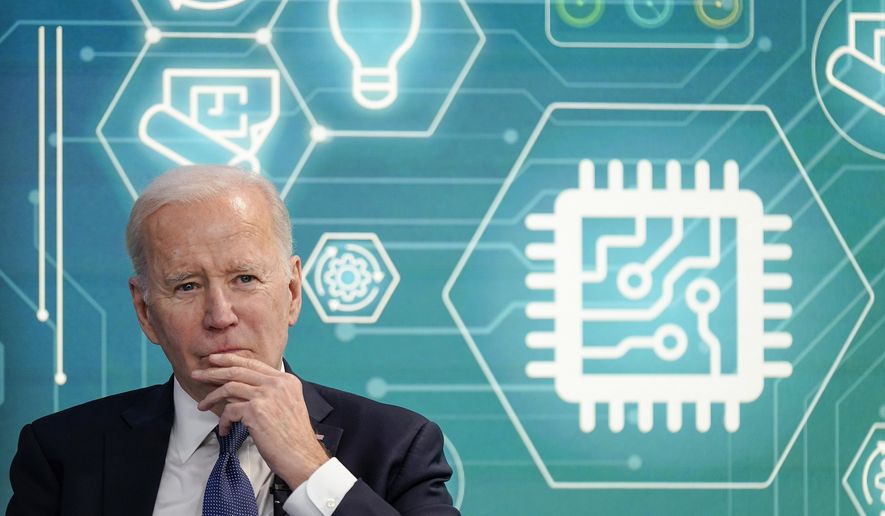President Biden on Tuesday lauded the $280 billion technology spending bill aimed at boosting domestic semiconductor manufacturing and spurring scientific research as proof that his administration can get legislation across the finish line.
The House gave final passage to the bill in a 243-187 vote last Thursday after the Senate passed the measure 64-33 earlier in the week in a key make-or-break legislative win for President Biden.
“The progress we’re making is proof that we’re the United States of America,” Mr. Biden said as he joined Michigan Gov. Gretchen Whitmer, a Democrat, for her signing of an executive directive that will implement the legislation in her state. “There’s nothing beyond our capacity when we work together.”
“This bill makes it clear that the world’s leading innovation will happen in America,” Mr. Biden said at the virtual event. “We will both invent in America and make it in America.”
Mr. Biden is expected to sign the measure into law in the coming days.
As an auto manufacturing hub, Michigan bore the brunt of the chip shortage, which was spurred by the pandemic-related supply chain snags.
SEE ALSO: Senate’s antitrust crackdown on tech stalls
Ms. Whitmer said that production delays driven by the chip shortage translated into 2.2 million fewer vehicles being produced in the U.S. in 2021, equaling 3,000 fewer days of work and affecting more than 575,000 domestic auto-related jobs.
“Once President Biden signs the Chips Act, the benefits will be felt far and wide and quickly,” she said.
“While the benefit to the mighty auto industry is clear, chips have a widespread impact. This bill will mean humming factories and lower costs on electronics, medical devices, farm equipment and cars for working families,” she added.
Congressional passage of the bill marked a modest legislative win for the White House and Democrats hungry for a legislative victory ahead of the Nov. 8 midterm elections.
It took capped months of tense negotiations on the long-stalled $52 billion incentive for chip manufacturers.
The White House has, for weeks, been in a full-court press to get the measure passed, urging lawmakers to shed a bevy of tough-on-China measures to get the broadly supported semiconductor funding to his desk before industry heavyweights take their money elsewhere.
SEE ALSO: Democratic investigators slam DHS IG, demand he step aside from Secret Service probe
Commerce Secretary Gina Raimondo, who led classified briefings last month on Capitol Hill to compel lawmakers to shuttle the stalled chip funding across the finish line, warns the U.S. is running out of time to woo chip manufacturers to its shores as other countries begin to roll out similar incentives.
Proponents of the bill, which includes more than $50 billion in the next five years for chip manufacturing and a 25% tax credit through 2026 for new chip production, say it will reduce America’s dependence on China and resolve a major supply chain issue that has contributed to high inflation.
Without a steady flow of semiconductors, which are used to manufacture a variety of goods, such as smartphones, washing machines and advanced weapons, proponents warn that the U.S. will be severely hobbled in maintaining economic stability in the future.
“The CHIPS and Science Act is exactly what we need to be doing to grow our economy right now,” Mr. Biden said in a statement praising Congress’ passage of the bill. “By making more semiconductors in the United States, this bill will increase domestic manufacturing and lower costs for families.”
Opponents, including some Republicans and independent Sen. Bernard Sanders of Vermont, labeled as “corporate welfare” the bill’s $52 billion of funding for the chip manufacturing industry.
• Joseph Clark can be reached at jclark@washingtontimes.com.




Please read our comment policy before commenting.